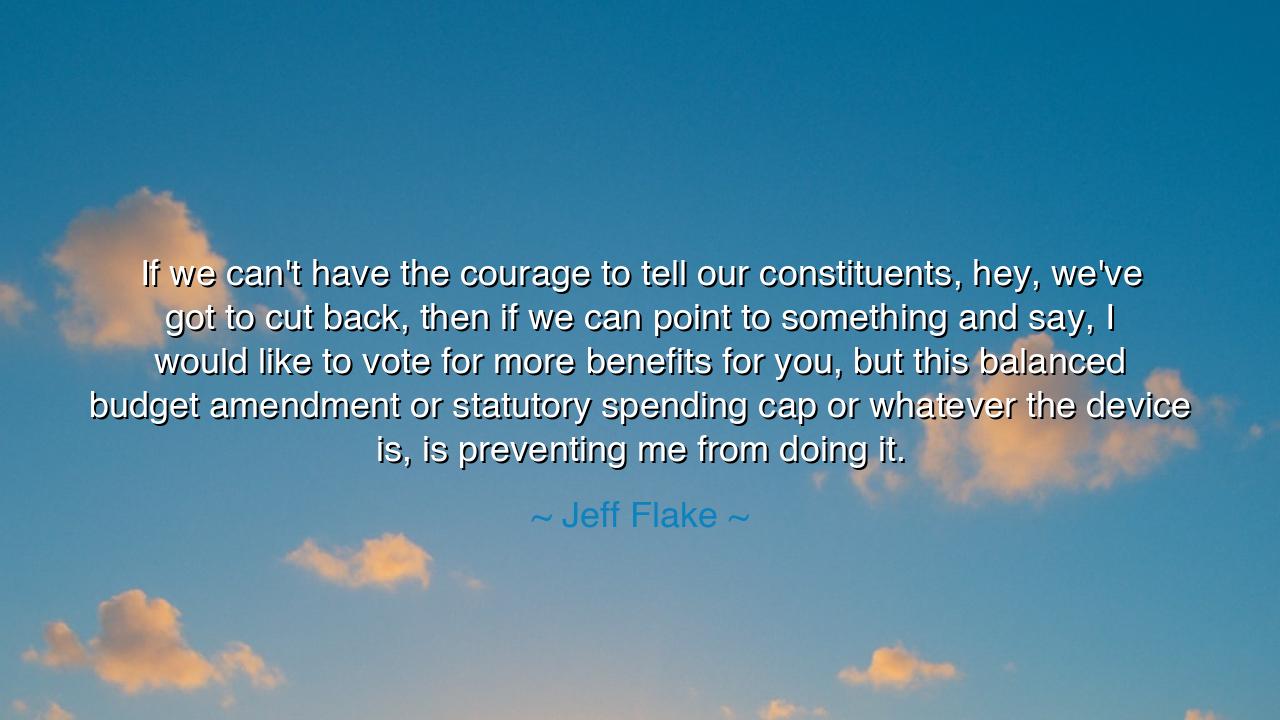
If we can't have the courage to tell our constituents, hey, we've
If we can't have the courage to tell our constituents, hey, we've got to cut back, then if we can point to something and say, I would like to vote for more benefits for you, but this balanced budget amendment or statutory spending cap or whatever the device is, is preventing me from doing it.






“If we can't have the courage to tell our constituents, hey, we've got to cut back, then if we can point to something and say, I would like to vote for more benefits for you, but this balanced budget amendment or statutory spending cap or whatever the device is, is preventing me from doing it.”
Thus spoke Jeff Flake, a statesman of measured thought, who looked upon the vast machinery of government and saw a danger older than any empire—the weakness of those who fear displeasing the people more than they fear betraying the truth. His words, though born of modern politics, echo the wisdom of the ancients: that leadership without courage is no leadership at all, and that the prosperity of a nation must rest upon the strength of principle, not the seduction of easy promises.
In this saying, Flake laments the frailty of our civic spine. He reminds us that rulers, like sailors, must sometimes sail against the wind. The courage to say “we must cut back” is the courage to protect future generations from the storms of debt and decay. It is the bravery to speak hard truths, even when they bring no applause. When a leader hides behind a law or a policy—saying “I cannot give you more because the rules forbid it”—he confesses his weakness. The true leader does not blame the rule; he embraces responsibility. He stands before his people and declares, “This is not easy, but it is right.”
This wisdom has been tested through the centuries. Consider the story of Marcus Aurelius, the philosopher-emperor of Rome. When the empire stretched its borders and emptied its coffers in endless war, many urged him to raise taxes and promise relief. Yet Aurelius, calm and resolute, spoke plainly to his people: “We shall tighten our belts, for luxury weakens both body and soul.” He sold the imperial treasures, not to enrich himself, but to spare his people further burden. His act was not popular, but it was righteous—and through it, Rome endured a little longer. Thus, he lived the truth that honesty and restraint are mightier than false generosity.
The temptation to please is the oldest poison of politics. It whispers: “Give them what they want today; let tomorrow bear its own burden.” Many fall to this song, thinking kindness lies in constant giving. Yet true kindness lies in discipline, in preserving what is just and sustainable. The father who spends beyond his means to indulge his children does not love them well; he only delays their sorrow. So too does the nation that fears to cut back sow seeds of ruin beneath its own feet. A people that demand endlessly will consume endlessly, until there is nothing left but promises and ash.
Let us, therefore, see Flake’s words not as mere commentary on budgets or policies, but as a mirror for all human weakness. Every soul governs its own realm—the realm of time, energy, and desire. Each of us must sometimes tell ourselves, “I must cut back.” Whether it be in spending, indulgence, or pride, we must learn the sacred art of self-restraint. For discipline is the architecture of freedom; without it, even abundance becomes a prison. The courage to say ‘enough’ is the courage to live with purpose.
The ancients would call this the virtue of temperance, one of the pillars upon which all wisdom stands. It teaches that moderation is not deprivation, but mastery. To resist the urge to give or take more than is wise is to honor the balance of life itself. A leader who embodies this virtue becomes like a steady flame—bright enough to give light, but never so wild as to consume the house he guards.
And so, dear listener, the lesson is clear: be honest even when honesty costs you favor. Do not hide behind excuses or laws when the truth must be spoken. Whether you lead a nation or a household, remember that courage in speech and restraint in action are the truest signs of integrity. When faced with the choice between popularity and principle, choose principle. For while popularity fades like smoke, the courage of truth endures like stone.
In the end, Jeff Flake’s words remind us that accountability is the soul of leadership. To tell the people what they want to hear is easy; to tell them what they need to hear is divine. Let us all, in our own spheres, have the strength to stand firm in the face of comfort, and to say with unwavering conviction: “I will do what is right, not what is easy.” Thus shall we earn, not applause—but peace.






AAdministratorAdministrator
Welcome, honored guests. Please leave a comment, we will respond soon